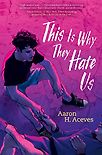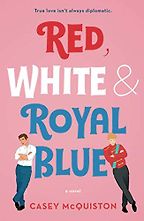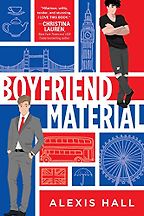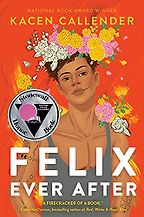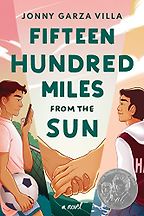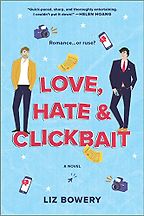Over the past decade there has been an increase in the visibility of romance novels that feature LGBTQ+ characters. What do you think the catalyst was—was there a certain book that became unexpectedly popular, or does it reflect a wider push for diversity more generally?
I think that it was a continuing perseverance of LGBTQ+ writers, the ones who were constantly writing stories, and maybe moving on to the next one if the first one or two didn’t take off. I also think that there was a push from queer writers who wanted to see more joy in books that featured queer protagonists. I remember seeing writers on social media push for more stories that dealt with the realities of our persecution, while also trying to make sure that it wasn’t all trauma porn for straight people. Queer writers banded together and were like: we want to be happy in books. We want to show hope.
Red, White, and Royal Blue by Casey McQuiston did this particularly well. That was a pivotal one. I saw Casey recently and they referred to the book as ‘cotton candy,’ which I feel categorizes it pretty well. Even something as simple as the pastel colors of the book itself—I think Red, White, and Royal Blue focused mainly on the enjoyment of falling in love.
It wasn’t the first one to do something like that, of course, I do think that it has helped established a way for other books like it to come through.
Speaking of diversity, there’s an idea that books with white protagonists tend to sell better than books featuring other races. How do you think that your book, This is Why They Hate Us, fits into that conversation? Was it important to you to write a book where the main character is both Mexican American and bisexual?
You know, it’s interesting. A lot of authors talk about how, when they first started writing, they wrote stories with white characters because that’s what they’d been told publishers wanted to see. I, luckily, don’t have a story like that. When I started writing books, I had Mexican protagonists. This is Why They Hate Us is the first queer book that I ever wrote, but I wrote two young adult novels before it—one of which will never see the light of day. From what you could tell, the protagonists were straight.
Honestly, I wanted to write a funny book about a queer Latina kid. I wanted it to be a romp, I wanted it to be raunchy. I wanted it to be in line with Superbad, but with a queer Latino protagonist. I tried writing in that one-note kind of way—I don’t mean ‘one note’ in a bad way—but I couldn’t stop the real world from seeping in as I wrote.
“There was a push from queer writers who wanted to see more joy in books that featured queer protagonists”
If you grew up when I grew up, in East Los Angeles, and you were a queer kid, there was still a certain way that you had to act. You had to be masculine no matter what. I couldn’t write something that felt true to me without mentioning the reality of where I came from. Maybe with the next book, I’ll be able to focus on it being a true love story and not mentioning those details, but with This is Why They Hate Us, I felt like I couldn’t be true to the book or to myself without mentioning it.
As for my own story, I knew that I was bi before I wrote the book, and I had come out to some close people. I didn’t come out on social media until the contract was signed and the book was ready to be announced. If you go back and look at the announcement for the book, it doesn’t specify the gender of the main love interest. It just says that he’s in love with his friend. I kept it that way because I wanted to come out separately and not through the announcement itself.
Let’s talk more about the first LGBTQ+ romance book that you’ve chosen to recommend: Red, White, and Royal Blue. Could you tell us a bit more about why you selected it?
This book is special to me because it features a Mexican bisexual character who is both ambitious and messy, and that’s funny to me. I know that being messy and ambitious aren’t cultural identities of any one marginalized group, but it’s so interesting that books can read you and show you another side of yourself as you’re diving into them. I related a lot to Alex and it was pretty inspiring to me to see that there’s a character like me out there in a book.
Five Books interviews are expensive to produce. If you're enjoying this interview, please support us by donating a small amount.
My own book was out on submission when I read Red, White, and Royal Blue. I met Casey, bought the book at the event, and I thought, okay, I hope this makes it easier for me to sell This is Why. On the other hand, I wanted to talk about all of the nuances that come out when you’re a bisexual Mexican guy who is writing a bisexual Mexican guy. I wanted to engage with the things that only I knew, and to be able to speak on that as well.
Your second book recommendation is Boyfriend Material by Alexis Hall. Tell me more about it.
Boyfriend Material is the book that I recommend to people after they finish Red, White, and Royal Blue. It’s that very classic, traditional story of opposites attract, where you have this upstanding, attractive, and handsome guy put together with a kind of messy and chaotic character. Although classifying it that way makes it sound like Boyfriend Material and Red, White, and Royal Blue are more similar than they really are.
Boyfriend Material is a fully fleshed-out story. Oliver is the put-together one, and I love that character. I loved seeing this robotic character become gently unraveled. I related heavily to Luc, although he’s a white British man. I remember when I was on a plane, and I was reading the sequel, Husband Material, and Luc’s thought process—this fear of being a bad person and whether or not those closest to you believe that you’re a bad person—I could recognize. I’ve had that same thought many times. Reading that scene in that book made me feel less alone and made me think that, actually, people probably wouldn’t prefer to not have me in their lives. That is the true power of messy characters
Felix Ever After by Kacen Callender is the third LGBTQ romance book on your reading list. It’s a YA romance about a trans teenager experiencing first love. What about this book appealed to you?
It’s romantic, and it’s funny, and it’s entertaining—but there’s a deep discussion of identity and trauma as well. What I’m learning is that romance isn’t always cotton candy; it can delve into these complex and dark topics. I was rereading the book Beach Read by Emily Henry and I thought, oh, they get into some deep shit in this, which made me feel like it was more literary fiction—but then I remembered that no, romance can talk about heavier subjects and still identify as a romance. With Felix Ever After, there’s a lot of depth in that book, and I got to learn too, which is never a bad thing. I love that book so much.
Your next book recommendation is Fifteen Hundred Miles from the Sun by Jonny Garza Villa, which features a teenage boy who accidentally comes out online. I’d love to hear what originally interested you in this one.
I was anticipating this book because I knew that it was about a gay Mexican boy. When I finished it, I felt it was everything that I want in a book. Like Felix Ever After, it is funny and smart and heartbreaking. It felt so realistic, but it also has the construction of a sitcom—with the setups. I did this with my book as well, because I love teen movies. I loved writing the snappy dialogue. I knew while writing my book, I wanted the parents to be supportive. They weren’t going to get everything right or even google the questions that they wanted to ask; they were even going to maybe say some offensive and inappropriate things, but I knew that in the end, they were going to be kind and supportive to Enrique. What I really appreciated about Fifteen Hundred Miles is that there’s an ugly truth and reality that I think is also necessary. I will also explore that in future books, but I think that Jonny does that really well in this book.
Your fifth, and final, LGBTQ+ romance recommendation is Liz Bowery’s book Love, Hate, and Clickbait. What was it about this title that caught your eye?
Well, it’s about two guys working on a political campaign and they eventually fall in love. The main character, Thom, is this extremely ambitious cold-hearted guy political consultant who absolutely just hates this other guy, Clay, who works in tech. Of course, over the course of the novel, Thom starts to fall for him because they have to pretend to be together for the sake of the campaign—and trouble ensues. It has some of the best sex scenes that I’ve ever read. I feel like the mechanics of it and the language that she uses is very clear and sensual. It’s also really funny and I truly enjoyed it!
Thank you for these recommendations. 2023 is now almost halfway over—where has the time gone? I’m curious if there are any LGBTQ+ romance novels that came out this year that you feel deserve more hype?
I haven’t read it yet, but I’m excited to read my friend James Acker’s book, The Long Run, which came out in February. He’s a screenwriter, and I’m always excited when screenwriters venture into novel writing because I really enjoy amazing, constructed scenes. I know that he’s going to do an excellent job with this. As for books that I’ve read this year, I haven’t been reading as many 2023 releases as I’d like to. I did read You’re a Mean One, Matthew Prince by Timothy Janovsky, who is another friend of mine. At the beginning of the year, I wanted to focus more on holiday reads, so I read that one and can’t recommend it enough.
Five Books aims to keep its book recommendations and interviews up to date. If you are the interviewee and would like to update your choice of books (or even just what you say about them) please email us at [email protected]

